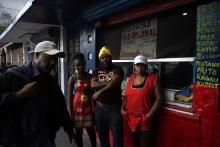Despite Gang Violence, the Dominican Republic Continues to Deport Haitians
The United Nations emphasizes that Haiti is in a dire situation and now is not the time to deport Haitians. The majority of deportations take place from the Dominican Republic with neither due process nor advance notice to the Haitian authorities responsible for receiving them. The International Organization for Migration (IOM) reports 154,333 Haitians were expelled by the Dominican Republic last year - about 87% of all deportations to Haiti in 2022. It is true that insecurity in Haiti affect the Dominican Republic as well - but conducting mass deportations only makes a bad situation worse - politically, economically, and for human rights. The full article by Jacqueline Charles of the Miami Herald follows.





